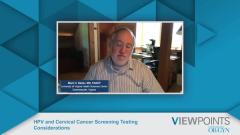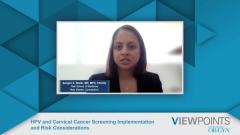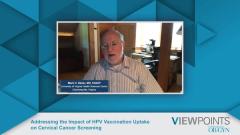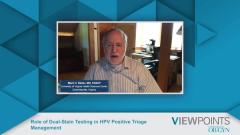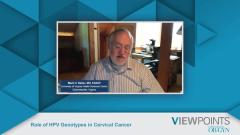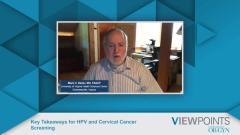
COVID-19 and Cervical Cancer Screening Rates
Thomas C. Wright Jr., MD; Emily K Hill, MD; and Sangini S. Sheth, MD, MPH, FACOG, comment on the impact COVID-19 had on HPV and cervical cancer screening in their respective practices.
Episodes in this series

Dr Sangini S. Sheth: There's lots of data to show that in the first few months of COVID depending on geographically where the surge was, as clinics and offices shut down doors, screening and preventative care took a huge hit, and that includes cervical cancer screening. It also includes vaccination. It seems that as surges moved on, screening rates did start to increase, but as we continue to go through these waves, I think most places have not resumed to the full rate of screening that everyone was seeing prior to the pandemic.
Dr Thomas C Wright Jr: Dr Hill, what's the story in Iowa?
Dr Emily K. Hill: Unfortunately, I would say we have problems with screening in Iowa at baseline even before COVID in terms of the number of cervical cancer patients that I see with invasive cancer; it is quite shocking, actually. I think there's definitely national data that screening rates for cervical cancer during the pandemic went down on the order of 80% to 90%, so there was a significant drop. Then I think you also have the backlog of people. You've got people who are aware that they need to do that screening, trying to catch up, and having trouble getting in or again forgetting about the need for that because they put it off for 2 years; then it sort of slips your mind entirely, so getting some of those women that would have come for screening back into our fold is a challenge.
Dr Thomas C Wright Jr: Certainly, with the older women who are, I would assume, more hesitant to come into the office than the younger women, you probably still have quite a backlog?
Dr Emily K. Hill: We do. I think I can say that, at least anecdotally, we certainly saw some women with locally advanced or metastatic cancers who we might not have seen if we didn't have the pandemic to contend with in really all of the cancers I take care of including cervical cancer.
Dr Thomas C Wright Jr: Certainly, in the New York area, the rate of screening, since I read the Pap smears, I do 80 a day, typically abnormal, perhaps now and before the pandemic. During the height of the pandemic through about August, it was down to 2 or 3. People just were not getting screened.
TRANSCRIPT EDITED FOR CLARITY
Newsletter
Get the latest clinical updates, case studies, and expert commentary in obstetric and gynecologic care. Sign up now to stay informed.


